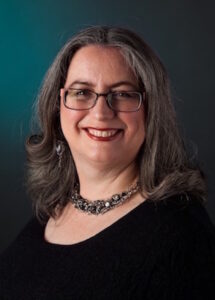Brewing Community is a series of guest posts in which readers, writers, artists and fans are invited to share their experiences of community. Whether online or in person, these groups bring a great deal of support and sometimes stress to their members. The aim of Brewing Community is to share the joy and find ways to brew stronger communities.
The series first ran in 2015. In returning to it after several years, I wanted to focus on how these experiences of community may have changed in recent years, and how people would like to see them change, as well as delving into what books and media have brought comfort in difficult times.
Today’s guest is Catherine Lundoff. I know her best as the driving force behind Queen of Swords Press and a fellow tea aficionado, but she’s also an author of speculative fiction and erotica, as well as a LGBQIA advocate. When it comes to building community and putting one’s money where one’s mouth is, Catherine is a shining example.
Since you’ve never been interviewed on Earl Grey Editing before, there’s one important question I must ask first: what’s your favourite beverage?
Tea! I tend to like rich, fruity or spiced black teas the best, but I also like a nice light fruity green tea and some herbals. So pretty much all the flavored teas, especially Novel Chai, which is Queen of Swords Press’s own tea blend from Bingley’s Teas, my local tea shop. 🙂
Has your experience of community in speculative fiction and fandom changed in recent years?
Ufda, as they say around here. Well, I began as a fan, not a writer, so for my first decade and a half in fandom, I was just going to conventions to hang with my friends, look at folks in costume, listen to authors and so forth. I started writing in my early thirties and publishing right around the same time and wow, did things shift! Conventions became more of a business setting and some people who had been friends became colleagues, or even competition, depending on how we perceived each other. This was the later 1990s well before COVID.
Once online community became nearly as important as in-person meetups in the early 2000s, I had a few books out and everyone who was published was expected to start promoting themselves a lot via blogs, websites, social media, etc. I think that element of self-promotion has always been a part of the writing life for genre fiction writers, but I also think it increased in intensity. My online and in-person communities have always had a fair amount of overlap so I learned to do a lot of building online networks, virtual friendships, finding allies and so forth within fandom and fannish context as well as working a limited convention circuit. I’ve been to fannish events outside cons but was never an organizer of anything besides author readings.
My success in finding the same level of community at local conventions as one I built online was decidedly more mixed. I came into local fandom as an out queer writer, older than many writers in the field with their first books out, and as a small press writer at that, and these things definitely colored my experience in the field. Add to that, I got my start in a genre not considered to be under the sf and f umbrella, a combination that caused me some grief in local writer circles. Despite that, I did make connections with other writers and fans that blossomed into deep, long-term friendships, but I also got a fair amount of nonsense from others, so definitely a mixed bag on that score.
Now, I approach community in fandom as a small press publisher and am seeing another shift in how I am received/perceived. Fandom looks a bit different from a position of power, however nebulous or small that power may actually be. At the same time, I’ve gotten a lot more recognition in the last couple of years as Queen of Swords Press has grown, our authors have done really well and I’ve passed some career milestones in terms of amount of work published, awards, etc. than I got when I was “just” an author.
And then, of course, came the pandemic and lockdown and huge shifts in how in-person communities within fandom operated. Shifting online has opened some more doors to me that I think might have remained closed if it was still essential to travel extensively to certain cons, for example. Now I’m focusing a lot on building online community since I anticipate that travel will be impacted for some time to come and my personal life has been impacted by the pandemic in ways that will make travel more difficult for me personally. Building online community is about building alliances as much as building readership and maintaining friendships. It doesn’t get easier, exactly, but wow, do you get to meet some cool folks!
What would you like to see changed?
Oh, so many things! As a small press publisher, I would love to see the field as a whole, conventions, readership, awards, etc. embrace new voices from small presses the way they embrace the voices from big presses. I’d like to see the small press and indies appreciated as a talent incubator and as a source of great fiction as well as a way to keep works that might otherwise vanish available and in the public eye.
As a writer, reader and fan, I really want to see fandom and fannish communities fully embrace writers and fans of color, queer writers and fans, international writers and fans and more. There’s a lot of lip service to diversity and what that means, but we’re still seeing significant problems with racism, transphobia, sexism, accessibility and so forth. As communities, we have to grow out of being stuck in an imaginary Golden Age when everyone fit into specific buckets, or lose the things that make being in fandom good and fun. We’ve got the opportunity to build new things, dazzling things, and we need to do the work to make that happen.
What books or media have you found yourself turning to for comfort?
Thanks to the pandemic, I had to get us on a couple of streaming channels since we couldn’t go to movies. So I’ve been exploring a lot of TV I hadn’t seen before. Current sfnal favorites include The Witcher, Killjoys and Wynonna Earp and recent seasons of Legends of Tomorrow and movies like Space Sweepers, The Old Guard and Vampires vs. the Bronx. I also like mysteries, with Lupin and Only Murders in the Building as particular favorites.
A lot of my reading is publishing-related, but my fun reading includes things like the new sf and f anthology It Gets Even Better: Stories of Queer Possibility, nonfiction like Braiding Sweetgrass by Robin Wall Kimmerer and mysteries like An Elderly Lady is Up to No Good by Helene Tursten. I’m also enjoying Persephone Station by Stina Lecht, all things by Martha Wells and Melissa Scott and A Master of Djiinn by P. Djeli Clark. And I would be remiss if I didn’t give a shoutout to Elizabeth Peters and Carole Nelson Douglas (Irene Adler series) for penning historical mysteries that I can lose myself in over and over again.
Catherine Lundoff is an award-winning writer, editor and publisher. She owns and operates Queen of Swords Press, a Minneapolis-based genre fiction publishing company and is a recipient of a 2021 Ladies of Horror Fiction Writing Grant. Blood Moon is the second volume in her Wolves of Wolf’s Point series. Her other books include Silver Moon, Out of This World: Queer Speculative Fiction Stories and Unfinished Business: Tales of the Dark Fantastic and as editor, Scourge of the Seas of Time (and Space). She is also the author of over 100 published short stories and essays which have appeared in such venues as Fireside Magazine, Nightmare Magazine, the SFWA Blog, Sherlock Holmes and the Occult Detectives, American Monsters Part 2 and such World of Darkness anthologies and games as Wraith: Haunting Shadows, Vampire the Masquerade: The Cainite Conspiracies and Wraith: Ghosthunters. In addition, she teaches writing classes at the Rambo Academy and Springboard for the Arts and she will be the Author Guest of Honor at Marscon 2022 in Minneapolis. Websites: www.catherinelundoff.net and www.queenofswordspress.com


